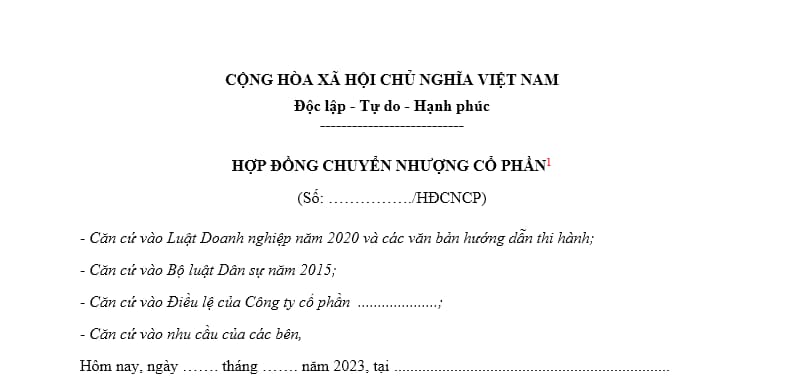What is the latest share transfer contract sample in Vietnam? What are the regulations on the transfer of shares?
What is the latest share transfer contract sample recently in Vietnam?
Currently, Vietnam Law does not provide for the Form of share transfer contract. Below is an image of the Share Transfer Agreement Form (for reference only):

Download the latest share transfer contract form recently in Vietnam: here.

What is the latest share transfer contract sample in Vietnam? What are the regulations on the transfer of shares?
What are the regulations on transferring of shares in Vietnam?
Pursuant to Clause 2, Article 127 of the Law on Enterprises in Vietnam 2020 stipulates as follows:
Article 127. Transfer of shares
1. Shares may be transferred freely except the cases specified in Clause 3 Article 120 of this Vietnam Law and other cases of restriction specified in the company's charter. The restrictions on transfer of shares specified in the company's charter are only applicable if they are written in the certificates of the shares subject to restriction.
2. The transfer shall be made into a contract or carried out on the securities market. In case of transfer under a contract, the documents shall bear the signatures of the transferor and the transferee or their authorized representatives. In case shares are transferred on the securities market, the transfer procedures prescribed by securities Vietnam Laws shall apply.
3. In case of the death of a shareholder that is an individual, his/her heir at Vietnam Law or designated by a will shall become a shareholder of the company.
4. In case a shareholder that is an individual dies without an heir or the heir refuses the inheritance or is disinherited, his/her shares shall be settled in accordance with civil Vietnam Laws.
5. A shareholder may donate all or part of their shares to other organizations and individuals; use the shares to pay debts. The organization or individual that receives the donation or debt payment will become a shareholder of the company.
6. The organizations and individuals that receive shares in the cases specified in this Article will only become shareholders when the information specified in Clause 2 Article 122 of this Vietnam Law is fully recorded in the shareholder register.
7. The company shall register the changes of shareholders in the shareholder register as requested by relevant shareholders within 24 hours after the request is received.
Thus according to the provisions on the transfer is carried out by contract or transaction on the stock exchange.
How many types of shares are there in a joint-stock company in Vietnam?
Pursuant to Article 114 of the Law on Enterprises in Vietnam 2020 stipulates as follows:
Article 114. Types of shares
1. A joint stock company shall have ordinary shares, which are held by ordinary shareholders.
2. In addition to ordinary shares, a joint stock company may have preference shares, which are held by preference shareholders. Preference shares include:
a) Participating preference shares;
b) Redeemable preference shares;
c) Super-voting shares;
d) Other types of preference shares prescribed by the company's charter and securities Vietnam Laws.
3. The persons that may purchase participating preference shares, redeemable preference shares and other preference shares shall be specified in the company's charter or decided by the GMS.
4. Every share of the same type will confer upon the holder equal rights, obligations and interest.
5. Ordinary shares cannot not be converted into preference shares. preference shares may be converted into ordinary shares under a resolution of the GMS.
6. Ordinary shares used as underlying assets to issue non-voting depository receipts are called underlying ordinary shares. Non-voting depository receipts have interest and obligations proportional to the underlying ordinary shares, except voting rights.
7. The Government shall provide for non-voting depository receipts.
Thus, according to current regulations, joint stock companies will have 02 types of shares: ordinary shares and preferred shares. In particular, ordinary shares are the type of shares that a joint-stock company is required to have. The holder of ordinary shares shall be referred to as a common shareholder.
In addition, preferred shares will include the following types:
- Participating preference shares;
- Redeemable preference shares;
- Super-voting shares;
- Other types of preference shares prescribed by the company's charter and securities Vietnam Laws.
LawNet
